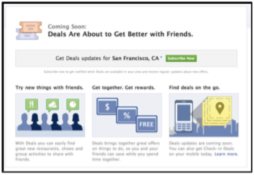Social Coupons
Social coupons are all the range in the U.S. this year. Consumers are signing up like crazy for “daily deal” emails and newsletters, with 56% of adult Internet users subscribing to at least two, and 45% passing the emails along to friends each week. This is viral marketing with instant revenue results.
| How often consumers access their daily deal emails | Percentage of respondents |
| Several times a day | 22% |
| Once per day | 38% |
| A few times a week | 23% |
| Once a week | 7% |
| Once a month or less | 3% |
| Never | 2% |
Source: Yahoo! Mail study, “Consumer Pulse,” March 3, 2011
Not only do consumers subscribe, they also open and redeem the coupons at an extraordinary rate. BIA/Kelsey predicts that social coupon revenues will reach $1.25 billion this year and nearly $4 billion by 2015.
Consumers are finding attractive deals in a variety of categories. Just before the last holiday season, 69% of U.S. consumers stated that they would use a daily deal for online shopping, 46% for restaurants, 30% for entertainment and activities, and 23% for health and beauty services, according to a survey by Eversave.
As of yet, there hasn’t been any widespread consumer complaint in the U.S. of the sort Groupon suffered in Japan last New Year’s season with the osechi ryori scandal. But marketers are expecting a shake-out, as consumer enthusiasm inevitably wanes, and too many competitors fight over a shrinking pie. New competitive entrants, like Tippr, BuyWithMe, ScoutMob, OpenTable Spotlight, and SocialBuy, are springing up everywhere. And the old-line local promotions companies, like Valpak, are experimenting with the model.
The complaints in the U.S. today are from small merchants, who are finding that, despite the increase in traffic, they are having trouble making any money from these promotions. The terms are onerous:
- Groupon keeps half of the revenues from the coupon sales, so a 50%-off deal gives the merchant only 25% of the regular price.
- The funds are paid out to merchants in installments over several months, impacting cash flow.
- Businesses must carefully calculate their capacity to serve an influx of new customers, or risk dissatisfying the very prospects they are paying to attract.
- Coupons are likely to attract deal-hunting consumers, who are less likely to return later and pay full price.
A 2010 study published by a professor at Rice University disclosed that, of 150 businesses that ran Groupons between June 2009 and August 2010, 32% said the promotion was unprofitable. Only 13% of coupon users returned.
But business owners are still signing up in droves. Consider the benefits:
- A low-cost way to generate trial users.
- As a pay-or-performance medium, social coupons generate free awareness-building among the entire list, irrespective of coupon use conversion.
- If purchasers buy more than the face value when they come to your place, or if they fail to redeem the pre-paid coupon, or—best of all—they do come back repeat purchase—that’s all gravy.
As a business model, the social coupon scene continues to grow. Started two years ago in Chicago, Groupon led the pack. Then in December 2010, Groupon’s founder, 30-year-old Andrew Mason, famously spurned a $6 billion purchase offer from Google. Its nearest competitor, Living Social, received a $175 million investment from Amazon in the same month. In January, Living Social gained a huge spike in membership when it offered an irresistible $20 coupon to Amazon.com for $10, and sold 1.4 million of them in a 20 hour period.
Facebook, with 600 million members globally, has announced its intention to enter the social coupon space, focusing on discounts for locally based activities that friends can enjoy together, like dining and entertainment. The Facebook program, called Deals, will be test marketed in Atlanta, Austin, Dallas, San Diego, and San Francisco.

The new Deals landing page for the San Francisco test.
One new wrinkle in the Facebook strategy is the plan to offer not only its own deals, but also those from partners, such as ReachLocal, Gilt City, Tippr, HomeRun.com, PopSugar City, KGB Deals, Plum District and Zozi. The power of Facebook’s reach is no doubt making Groupon and Living Social executives quake with fear for their future.


